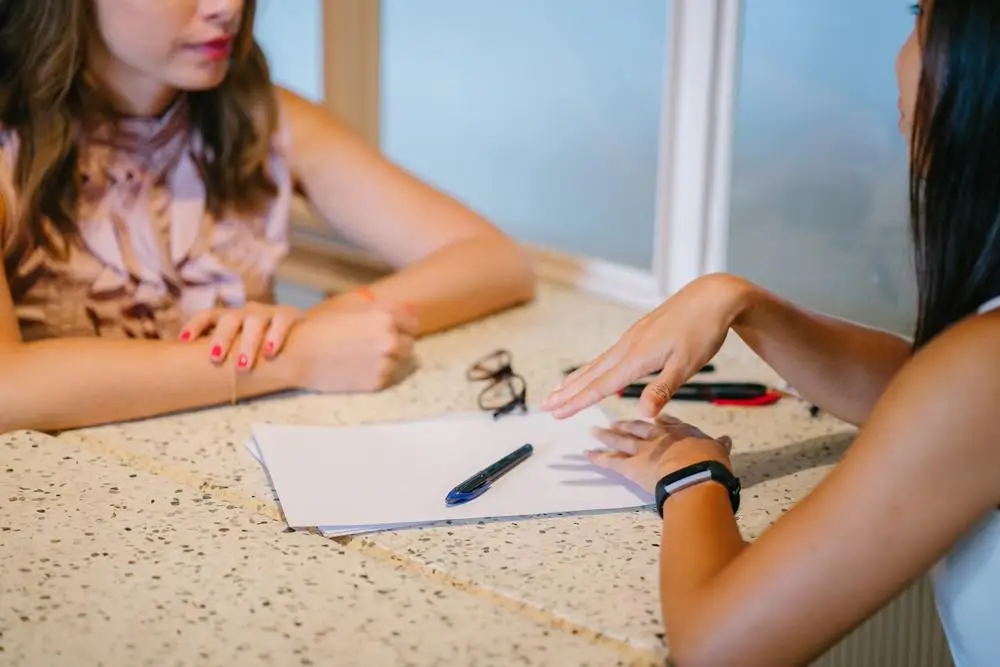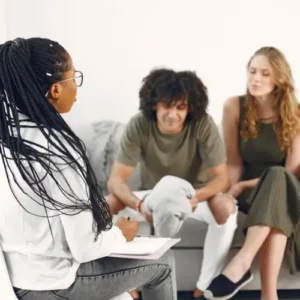Sometimes, conversations turn into confrontations, and before you realize it, the relationship you cherished appears to be on the brink. But, does it mean it’s beyond repair? Not necessarily. Couples therapy—is a potent resolution that has aided many couples to rekindle their bond, resolve conflicts, and strengthen their relationship. However, the key to effective couples therapy is finding a therapist who is just right for you. But how to find a couples therapist who is a right fit for you? Let’s dive in and find out!
Contents
- 1 Deciding You Need a Couples Therapist
- 2 Tips for Finding the Right Couples Therapist Near You
- 2.1 Research
- 2.2 Leverage Online Directories and Search Engines
- 2.3 Qualifications and Expertise
- 2.4 Look for Local Mental Health Clinics and Counseling Centers
- 2.5 Ask for Recommendations
- 2.6 Contact Professional Associations
- 2.7 Consider Teletherapy
- 2.8 Approach and Philosophy
- 2.9 Logistics
- 2.10 Initial Consultation
- 2.11 Trust Your Gut
- 2.12 Questions You Might Ask a Couples Therapist
- 3 What Does the Process Look Like?
- 4 Can a Therapist Resolve The Issues?
Deciding You Need a Couples Therapist
 The decision to seek couples therapy can be quite overwhelming. Many people associate therapy with ‘serious problems‘ or ‘last alternative,’ but that isn’t always the case. Recognizing the need for therapy isn’t a sign of a failing relationship; instead, it shows a willingness to work on improving it.
The decision to seek couples therapy can be quite overwhelming. Many people associate therapy with ‘serious problems‘ or ‘last alternative,’ but that isn’t always the case. Recognizing the need for therapy isn’t a sign of a failing relationship; instead, it shows a willingness to work on improving it.
So, when should you consider couples therapy? There isn’t a one-size-fits-all answer to this because every relationship is unique and has its own set of challenges. However, some common signs indicate you might benefit from couples therapy.
One of the most glaring signs is a constant conflict or arguing. If you find yourself stuck in a pattern of repeated arguments over the same issues with no resolution, it may be time to seek help.
Another sign is when communication has broken down. You might feel like you’re walking on eggshells around your partner, or maybe conversations that used to be normal now end up in hurt feelings or fights.
Sometimes, you might also feel a growing emotional or physical distance from your partner. You’re no longer sharing the same level of intimacy, and you may feel more like roommates than a couple.
Finally, the decision to seek therapy might come after a significant event that has shaken your relationship, such as an affair, a traumatic event, or a major life change. Such events can create deep wounds in a relationship that requires professional help to heal.
Tips for Finding the Right Couples Therapist Near You

To find a couples therapist that’s right for you is much like finding the perfect pair of shoes—it has to be the right fit, comfortable, and suitable for your needs. If it isn’t, it won’t serve its purpose no matter how costly or beautiful it looks. Here are some steps you can take to ensure you make the right choice.
Research
Begin with thorough research. You can seek recommendations from friends, family, or even your primary care physician. Look up therapists near your area, visit their websites, read their bios, and review their specializations. There are also dedicated directories and professional organizations for therapists that can be useful.
Leverage Online Directories and Search Engines
A simple online search of “couples therapist near me” can yield extensive results. You can refine this search based on your specific needs, like “LGBTQ+ friendly couples therapist near me” or “Christian couples therapist near me.” Online directories often provide therapist profiles, reviews, and contact information. Websites like Psychology Today have comprehensive databases of therapists across different locations.
Qualifications and Expertise
Ensure the therapist you’re considering is licensed and has the necessary qualifications. It’s also beneficial if they have specialized training or certification in couples therapy or a related field. Furthermore, find out how much experience they have working with couples and dealing with issues similar to yours.
Look for Local Mental Health Clinics and Counseling Centers
Many mental health clinics and counseling centers offer couples therapy. Visit their websites or give them a call to find out more about the therapists they have on board and the modalities they use.
Ask for Recommendations
Personal recommendations from friends, family, or other healthcare professionals can be highly reliable. They can share their personal experiences and give you an insight into the therapist’s approach and effectiveness.
Contact Professional Associations
Professional associations like the American Association for Marriage and Family Therapy (AAMFT) or the International Centre for Excellence in Emotionally Focused Therapy (ICEEFT) have resources to help you find a qualified couples therapist in your area.
Consider Teletherapy
If you can’t find a suitable therapist near you, consider online therapy or teletherapy. It can offer you a wider range of therapists to choose from, and you can have sessions from the comfort of your home.
Approach and Philosophy
Every therapist will have a unique approach to therapy. Some might follow a more traditional method like cognitive behavioral therapy, while others might use more modern methods like emotionally focused therapy. It’s important to understand their approach and see if it aligns with what you and your partner are comfortable with.
Logistics
Practical aspects matter too. Consider their location, availability, session length, and fees. It’s also important to find out their policy on missed sessions and their flexibility in scheduling appointments.
Initial Consultation
Most therapists offer an initial consultation, either free or for a minimal fee. This is a golden opportunity for you to get a feel of their style and see if it’s a good fit for you and your partner. Use this time to ask any questions or address any concerns you might have.
Trust Your Gut
Finally, trust your instincts. Even if a therapist checks all the boxes on paper, if something doesn’t feel right, it’s okay to keep looking. You’re about to embark on a personal and sometimes challenging journey—you want to do this with someone you feel comfortable with.
Remember, it’s okay if you don’t find the right couples therapist immediately. You might need to meet a few before you find ‘the one.’ The important thing is not to rush this process because the success of your therapy greatly depends on the right therapist.
Questions You Might Ask a Couples Therapist
Once yo u’ve shortlisted potential therapists, you’ll want to ask them some questions to ensure they’re the right fit for you and your partner. Here are some questions you might consider:
u’ve shortlisted potential therapists, you’ll want to ask them some questions to ensure they’re the right fit for you and your partner. Here are some questions you might consider:
- What are your qualifications and licensure?
This helps you verify their professional credibility. You want to ensure the therapist is licensed to practice in your state and has qualifications in couples therapy or related fields. - What’s your experience with couples therapy?
It’s important to know how many couples they’ve worked with and how familiar they are with issues similar to yours. - What is your approach to couples therapy?
Therapists can have different approaches, like cognitive behavioral therapy, emotionally focused therapy, Gottman method, etc. Understanding their approach can help you determine if it aligns with your needs. - What is the structure of a typical session?
This gives you an idea of what to expect during your therapy sessions—how long they last, if both partners are always involved, how often they are, etc. - How do you handle confidentiality?
It’s crucial to know how they handle sensitive information shared during therapy sessions. - What is your policy on cancellations and rescheduling?
This helps you understand the flexibility and terms in case you need to cancel or reschedule a session. - What are your fees, and do you accept insurance?
It’s important to be clear about the financial aspect from the start. If you have insurance, ask if they accept it and what the process would be. - How do you handle individual sessions?
Some couples therapists might offer individual sessions along with couples sessions. If this is something you’re interested in, it’s good to ask about it. - How will we set goals and measure progress?
This helps you understand their process of setting therapy goals and tracking your progress.
Remember, the initial consultation is not just for the therapist to understand you but also for you to understand them. So don’t hesitate to ask any question you think will help you make your decision.
What Does the Process Look Like?
 The process of couples therapy can vary based on the therapist’s approach, your unique situation, and your therapy goals. However, there are some common stages:
The process of couples therapy can vary based on the therapist’s approach, your unique situation, and your therapy goals. However, there are some common stages:
- Initial Assessment: The therapist will start by getting to know you and your partner. They’ll seek to understand your backgrounds, the history of your relationship, and the issues you’re currently facing. This stage is crucial as it helps the therapist form a treatment plan.
- Goal Setting: Based on the initial assessment, the therapist will work with you to set therapy goals. These are the issues you want to work on and the changes you hope to see.
- Therapy Sessions: Regular therapy sessions then begin. The therapist might use various techniques to encourage communication, foster understanding, and develop conflict-resolution skills. They might also give you ‘homework’—activities or discussions to carry out at home.
- Evaluation and Termination: Periodically, the therapist will evaluate the progress towards your goals. Once these goals are achieved, or significant progress is made, the therapist might suggest terminating the therapy.
Can a Therapist Resolve The Issues?
 While a couples therapist can guide and facilitate the process, the resolution of issues largely depends on the couple. The therapist provides the tools and strategies, but it’s up to the couple to use them effectively. Couples therapy can help address various issues, like communication problems, conflicts, intimacy issues, and more. However, its success depends on factors like the willingness of both partners to change, the severity of the problems, and how early in the conflict the therapy begins.
While a couples therapist can guide and facilitate the process, the resolution of issues largely depends on the couple. The therapist provides the tools and strategies, but it’s up to the couple to use them effectively. Couples therapy can help address various issues, like communication problems, conflicts, intimacy issues, and more. However, its success depends on factors like the willingness of both partners to change, the severity of the problems, and how early in the conflict the therapy begins.
Remember, couples therapy isn’t a magic cure. It requires effort, time, and patience. But with the right therapist and a commitment to the process, it can help improve relationship satisfaction, foster deeper connections, and equip you with the skills to navigate future conflicts.
Conclusion
Choosing to seek help in the form of couples therapy is a commendable first step towards mending, improving, and possibly transforming your relationship. Remember, the process to find the right couples therapist might feel long and sometimes even overwhelming, but the time and effort invested in this process can pay off significantly in the long run.
However, if you are looking for a couples therapist, your search ends here!
At CoupleMantra our experienced relationship therapists are here to provide you with the support and tools you need to heal, grow, and thrive together. Book a trial Online Couple Counseling.


